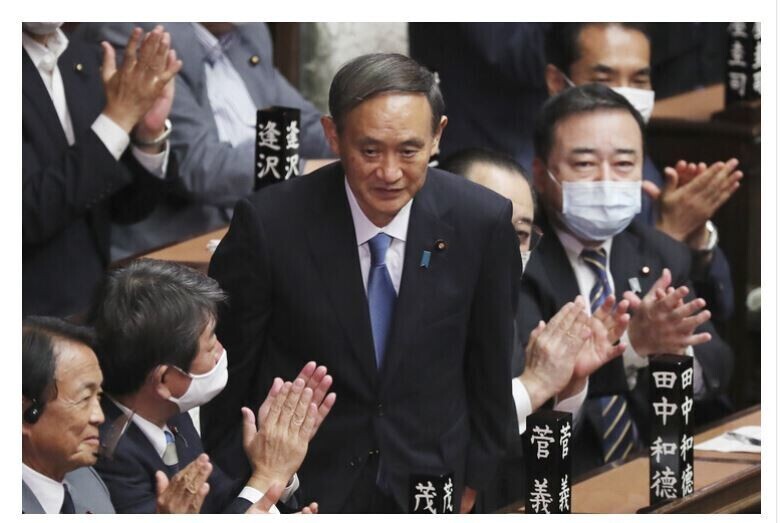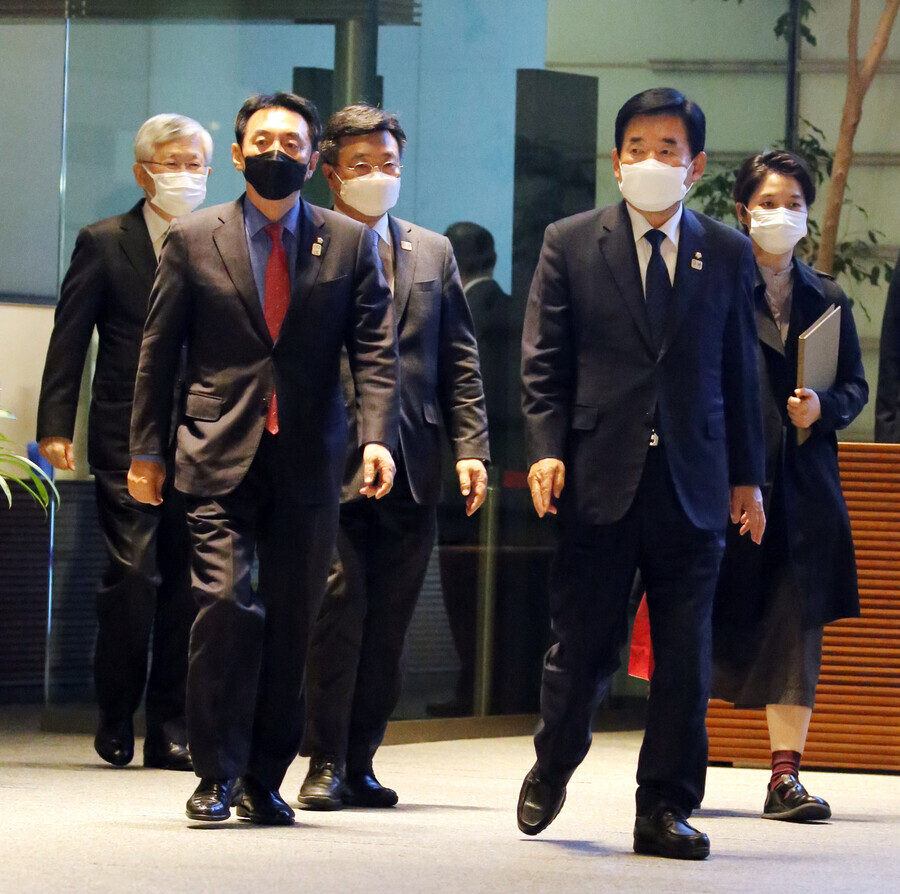hankyoreh
Links to other country sites 다른 나라 사이트 링크
LDP secretary-general advocates using Tokyo Olympics as opportunity to restore S. Korea-Japan relations

The Japanese government is taking active steps to sustain a hard-won resumption of dialogue with South Korea, even as it maintains that Seoul is responsible for coming up with a solution on the two countries’ dispute over the issue of forced labor survivors. Tokyo’s determination appears to be that improving relations with Seoul represents a good opportunity both politically and diplomatically for Prime Minister Yoshihide Suga, who marked two months in office on Nov. 16.
Liberal Democratic Party (LDP) Secretary-General Toshihiro Nikai, a close associate of Suga’s, stressed the importance of South Korea-Japan relations during a live broadcast on the private network BS Fuji on the evening of Nov. 13. In his remarks that day, Nikai said it was a “very good idea to use the Tokyo Olympics to find a way out of the deadlock our diplomacy is currently stuck in.”
“This needs to be done in a big way,” he suggested. Nikai had previously met in succession with visiting South Korean National Intelligence Service (NIS) Director Park Jie-won on Nov. 8 and Korea-Japan Parliamentarians’ Union Chairperson Kim Jin-pyo on Nov. 12. In August 2019, Nikai postponed and then cancelled a meeting with a visiting delegation from the South Korean National Assembly at a time when the two sides were facing a deep chill over Japan’s controls on exports to South Korea and the issue of compensating survivors of forced labor.
Nikai also remarked on the idea of a joint declaration between South Korean President Moon Jae-in and Suga, which would include a new direction for South Korea-Japan relations along the lines of the 1998 declaration by Kim Dae-jung and Keizo Obuchi.
“We should make good use of the course laid out by our predecessors,” he suggested. While he did not offer any particular solutions on the forced mobilization issue, Nikai noted that the “international community is watching to see how Japan resolves things with our neighbors in South Korea,” adding that matters “need to be resolved through dialogue” and that the “public will understand.” Nikai is considered one of the key figures responsible for Suga’s success in becoming the prime minister.
Analysts suggested another reason for the full-scale dialogue push is the fact that improved South Korea-Japan relations stand to present a good opportunity to Suga if they increase interest in the Tokyo Olympics and help impact a resolution of the issue of Japanese citizens abducted to North Korea. The Tokyo Shimbun newspaper wrote, “The South Korean government’s support is essential for the Suga administration’s key tasks, namely resolving the Japanese abductee issue.”

As it marks two months in office, the Suga administration is facing a tough situation in terms of government affairs. The COVID-19 pandemic shows no signs of abating, and support for the Cabinet has failed to recover from a drop owing to the refusal to appoint six members of the Science Council of Japan in what amounted to a blacklisting situation. Support for Suga’s administration has fallen from stratospheric levels in the 60-80% range shortly after he took office to the 50-70% range. While some factors may include the election and dissolution of the House of Representatives, the majority view is that Suga’s reelection prospects once his term ends in September 2021 will be unclear if the Summer Olympics in Tokyo are unsuccessful.
Currently scheduled for July 2021, the Olympics are expected to be held in a drastically downscaled format owing to the COVID-19 pandemic. Another burden for Suga is the intense speculation that predecessor Shinzo Abe may run again for prime minister, having resumed his political activity recently amid a gradual recovery in health. Abe cited health issues before stepping down earlier this year.
Still no clear solution on forced labor issueEven with a climate favoring dialogue taking shape between South Korea and Japan, the prospects for finding a solution on the key issue — survivors of forced labor — do not appear straightforward. Tokyo has been approaching the matter cautiously, fearing a backlash from right-wingers and the Japanese public. Japan has continued to refuse to offer an apology or compensation for forced labor mobilization, maintaining that the issue was fully resolved with the two sides’ 1965 Claims Settlement Agreement. The Japanese government has also supported Tokyo’s position. Survey findings showed 70% of Japanese respondents saying they found a 2018 South Korean Supreme Court decision ordering compensation for survivors to be “unacceptable.”
Reporting on the recent Japan visits by senior South Korean figures, the Yomiuri Shimbun newspaper said on Nov. 14 that the visitors had “not presented any realistic ideas at all for resolving” the forced labor issue, calling it a “zero response” for Japan.
“At this rate, the [Japanese government’s] position is that it will not agree to holding a South Korea-China-Japan summit,” it said.
By Kim So-youn, staff reporter
Please direct comments or questions to [english@hani.co.kr]

Editorial・opinion
![[Column] Welcome to the president’s pity party [Column] Welcome to the president’s pity party](https://flexible.img.hani.co.kr/flexible/normal/500/300/imgdb/original/2024/0515/3917157400447943.jpg) [Column] Welcome to the president’s pity party
[Column] Welcome to the president’s pity party![[Editorial] Korea must respond firmly to Japan’s attempt to usurp Line [Editorial] Korea must respond firmly to Japan’s attempt to usurp Line](https://flexible.img.hani.co.kr/flexible/normal/500/300/imgdb/original/2024/0514/2317156736305813.jpg) [Editorial] Korea must respond firmly to Japan’s attempt to usurp Line
[Editorial] Korea must respond firmly to Japan’s attempt to usurp Line- [Editorial] Transfers of prosecutors investigating Korea’s first lady send chilling message
- [Column] Will Seoul’s ties with Moscow really recover on their own?
- [Column] Samsung’s ‘lost decade’ and Lee Jae-yong’s mismatched chopsticks
- [Correspondent’s column] The real reason the US is worried about Chinese ‘overcapacity’
- [Editorial] Yoon’s gesture at communication only highlights his reluctance to change
- [Editorial] Perilous stakes of Trump’s rhetoric around US troop pullout from Korea
- [Guest essay] Preventing Korean Peninsula from becoming front line of new cold war
- [Column] The state is back — but is it in business?
Most viewed articles
- 1[Column] Welcome to the president’s pity party
- 2Could Korea’s Naver lose control of Line to Japan?
- 3Naver’s union calls for action from government over possible Japanese buyout of Line
- 4US has always pulled troops from Korea unilaterally — is Yoon prepared for it to happen again?
- 5[Editorial] Korea must respond firmly to Japan’s attempt to usurp Line
- 6Major personnel shuffle reassigns prosecutors leading investigations into Korea’s first lady
- 7[Editorial] Transfers of prosecutors investigating Korea’s first lady send chilling message
- 8[Column] Will Seoul’s ties with Moscow really recover on their own?
- 9[Correspondent’s column] The real reason the US is worried about Chinese ‘overcapacity’
- 10Extended deterrence for S. Korea admits North Korea’s de facto status as a nuclear state